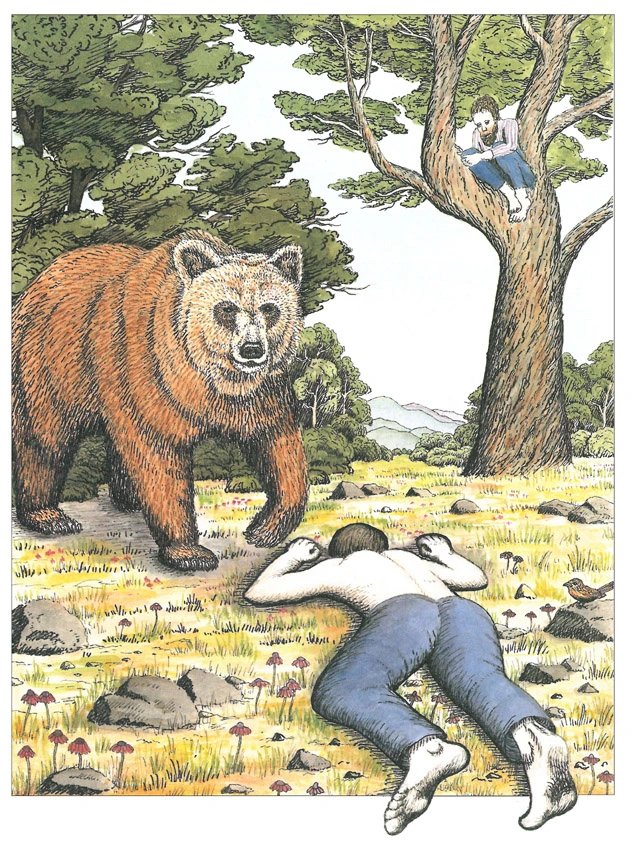I gave the order to cut them down. I wanted the place to be lighter, neater, and most of all, I wanted to make life easier for the old poplar, for I thought all those young trees were coming from it and drawing the sap out of it.
As we were cutting down those young saplings, now and again I had a pang of conscience as we dug out their sap-rich roots. It took four of us to pull up one half-hewn sapling; It was hanging on to its life for all it was worth and did not want to die. And I thought to myself, “They evidently need to live if they cling on to life so firmly.”
But we had to cut them down, so I did. Only subsequently, when it was too late, did I realize we should not have destroyed them.
I had thought that the shoots drew sap from the old poplar, but it turned out to be the other way around. Once I had cut them down the old poplar began to die. When leaves began to appear I noticed that half its boughs were bare, and that summer it withered altogether. It had been dying for some time and, knowing its end was near, had transferred life to its shoots.

That is why they grew so quickly. In wanting to make life easier for it I had killed all its children.
HOW MANY GEESE
MAKE SIX?

A poor peasant once went to the squire to ask for food. It did not seem proper to go empty-handed, so he stole a neighbor’s goose, roasted it, tucked it under his arm, and took the bird with him to the manor.
Surprised and not a little suspicious, the squire accepted the roast goose but told the peasant:
Thank you for the goose. But you give me a problem: You see, I have a wife, two sons, and two daughters — six of us altogether. Now how am I to share the goose equally, so that no one is offended?”
The peasant smiled craftily.
“Sire, permit me to divide it for you.”
Taking a knife, he cut off the goose’s head, saying, “Sire, you are the head of the household, thus you rightfully get the head.”
Next he sliced off the goose’s rump and handed it to the wife.
“Dear Lady, you sit at home all day looking after the house — so yours are the hindquarters.”
Then he chopped off the feet and gave them to the sons.
The feet are for you,” he said, “because you are to follow in your father’s footsteps.”
And the daughters got the wings.
“Soon, my dear young ladies, you will fly from this house to find a husband — here are your wings“
“To be fair I’ll take the rest for myself,” he said, heading for the door.
The squire, greatly amused by the peasant’s impudence, rewarded him with food — and money
Now this story reached the ears of a rich peasant. Being envious, he quickly set to roasting five geese for the squire.
“I thank you for the geese,” the squire said. “But, you see, I have a problem: Here are my wife, two sons, and two daughters — six altogether. How are we to share your five geese equally?”
The rich peasant was at a loss.
Thereupon, the squire sent for the poor peasant to ask his advice.
THE “DEAD” MAN
AND THE BEAR

Two companions were on their way through a forest when they were suddenly attacked by a big brown bear. One quickly took to his heels, scrambled up a tree to safety, and hid, leaving the other behind.
What was the poor man to do? It was too late to flee.
Trembling with fear, he flung himself to the ground pretending to be dead. The bear was puzzled. He poked and sniffed the still form: first its toes and fingers, then its neck and hair.
The man was afraid to breathe.
After what seemed an age, the bear gave the fellow’s ears a loud snuffle, grunted, and, thinking him really dead, ambled off through the trees.
No sooner was the bear out of sight than the first companion climbed down the tree, laughing with relief.
“Well, friend,” he said, “what did that old bear whisper in your ear?”
The other smiled.
“He gave me some good advice,” he said. “He told me to beware of those who leave their friends in danger . . .”

THE LITTLE BIRD

It was Misha’s birthday and he had lots and lots of presents. But best of all was one from his uncle — a wooden bird cage. The cage was so cleverly made that it could catch birds all by itself: All you had to do was sprinkle seed upon a platform, hang the cage out of doors, let a bird fly in and perch on the platform. Then the platform would turn over, shutting the cage door at the same time.
Very simple.
Misha was overjoyed. He immediately ran to show the present to his mother. But she was not pleased at all.
“What a nasty contraption!” she exclaimed. “Why do you want to catch birds? Leave the poor things alone.”
“I’ll put them in my cage,” explained Misha, “and they’ll sing for me.”
He found some seed, sprinkled it on the platform, hung the cage in the garden, and waited for birds to fly in.
But the birds were scared of him and would not come near.
After a while he went indoors to have his dinner and quite forgot about the cage. But when he had finished his meal and went into the garden, he was delighted to find a little bird fluttering inside the cage.
“Mama, look, I’ve caught a bird!” he shouted in his excitement. “It’s a nightingale, I shouldn’t wonder. See how fast its heart is beating.”
But his mother said, “It’s a sparrow.
1 comment